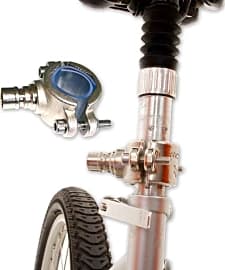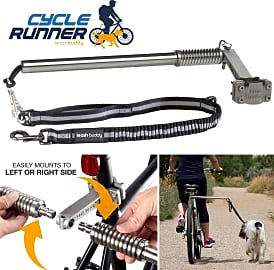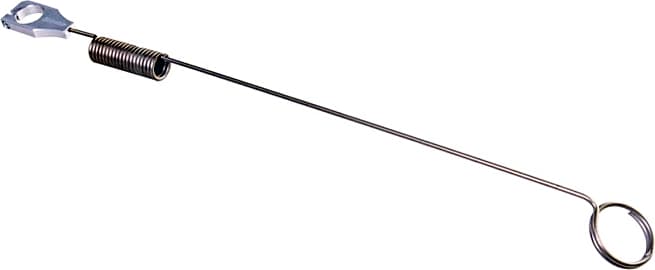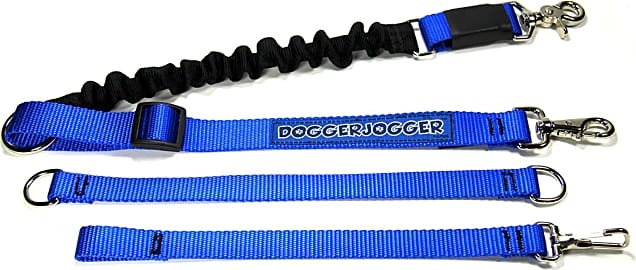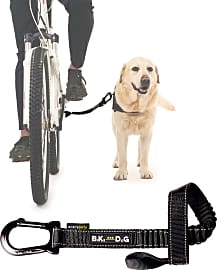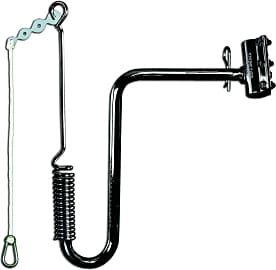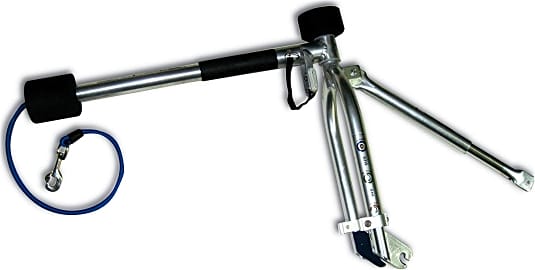The 9 Best Dog Bicycle Leashes

This wiki has been updated 40 times since it was first published in October of 2015. If cycling is your preferred form of exercise or mode of transportation, you can take your furry friend along by using one of these dog bicycle leashes. These options are designed to prevent Fido from pulling you over while keeping him protected from the pedals and tires. Just remember to monitor your pooch's energy level and water intake to prevent fatigue and dehydration. When users buy our independently chosen editorial picks, we may earn commissions to help fund the Wiki.
Editor's Notes
January 06, 2020:
Because we are concerned about its long-term durability, we have opted to remove the Petego Cycleash. There are sturdier choices, including the Cycle Runner Leash Buddy and the Springer Dog Exerciser. Unfortunately, the directions that come with the latter are not exactly clear, so if you aren't handy or don't have a lot of patience, you might plan on enlisting the help of a bike shop or a friend. We've elected to keep the Woof Cycle Bike Trotter, even though it is not the most robust option available. Some users like the design, but it may not be strong enough for big, heavy breeds that like to pull. As for top choices, we've kept two popular options, the Bike Tow Leash and the Walky Dog Plus. We added The DoggerJogger, as well, which is simple, priced affordably, and even converts to a regular leash. But no matter which of these options you ultimately choose, be sure to introduce your dog to its new exercise slowly, and never push it to do too much, too fast. Some dogs enjoy and can handle more exercise, while others may always prefer a slow walk or a bike trailer.
A Culmination Of Safety, Innovation, And Fun
Medium to large breeds over 25 pounds benefit the most from the dog bicycle leash due to their overall size and stamina for keeping up with a rider over long distances.
People who love animals understand the strength of the bond that forms in such a reciprocal relationship. So, when the time comes to take a bicycle ride, you shouldn't be forced to leave your furry friend at home and unable to participate. Since getting plenty of exercise is equally important to you both, a leash designed specifically to facilitate an easy and safe ride will provide an excellent change of pace from that usual walk around the park.
The bike dog leash is a special attachment that typically consists of a sturdy aluminum or steel tube with a plastic-coated cable running through it and extending outward, giving your furry friend the freedom to move without the danger of running into the bike itself. One end of the leash attaches to the bicycle (often to the left side), while the other attaches onto your dog's collar or harness. The leash acts as a boundary line keeping you and your dog traveling alongside one another without the danger of crossing paths in the middle of a ride, maximizing safety and minimizing the potential for taking a tumble.
Use of a bike leash allows a rider to maintain a firm grip on both handlebars, which can help prevent the dog from toppling the bike with erratic movements or sustaining injuries himself. A rider's attention cannot be safely divided between holding a leash in one hand and operating the bike's components with the other. Not only is this inconvenient, but it's also quite dangerous. The bike leash can minimize the chances of this occurring based on the way it attaches to the bike's frame, maintaining a rider's overall stability and center of gravity, even when Fido tugs and pulls. An additional advantage to the dog bike leash is its use of an integrated spring system that allows it to quickly absorb shocks and impacts when both a rider and canine are in motion.
Medium to large breeds over 25 pounds benefit the most from the dog bicycle leash due to their overall size and stamina for keeping up with a rider over long distances. It's a great option for particularly hyperactive pooches with a lot of energy to expend. While a Chihuahua may not be the best candidate for a bike leash, there are other alternatives to allow pups of this size to still enjoy a ride.
Proceeding With Patience And An Open Mind
Regardless of the bike leash you choose, one of the first considerations to keep in mind is getting your dog accustomed to the device and experience. If your pooch is new to biking, start with an introduction to the leash. Allow the dog to see what the leash looks, smells, and feels like. Next, try walking down a bike path with the dog attached to the leash to see how he responds to it. If he gets nervous, encouraging him with treats is a good idea for some positive reinforcement. It's important to let Fido set the pace in this situation so that he becomes more comfortable over time.
Regardless of the bike leash you choose, one of the first considerations to keep in mind is getting your dog accustomed to the device and experience.
Consider the shape and flexibility of the leash you plan to purchase. A contoured option with an adjustable length is easy to install and it can absorb the energy coming from a highly-active and energetic pooch. The extra length also ensures the dog's freedom of movement with plenty of slack for avoiding obstacles in their path. If you plan to bike in extreme weather with your pet, the tube component that houses the leash attachment should be comprised of something durable and rustproof, such as aluminum or high-carbon steel.
If Fido is agile and prey-driven with a desire to run, tug, and pull during your bike ride, then this type of design can be a big help when traversing rough terrain that might not be as forgiving. Integrated quick-release mechanisms provide additional safety and convenience should you ever need to disengage your pup from the bike in an emergency. Quick releases also make it easy to detach a leash from one bike and switch seamlessly to another. Many bike leashes are also capable of attaching directly onto your dog's harness instead of a collar, which can afford even greater control over the animal's body without straining their neck.
A Brief History Of The Dog Bicycle Leash
There is archaeological evidence that suggests the dog was domesticated by humans as many as 15,000 years ago. However, the invention of the bike leash is a bit more recent. Consider for a moment that without the longstanding human need or desire for canine companionship over the ages, the dog bicycle leash may never have been developed in the first place.
However, the invention of the bike leash is a bit more recent.
One of the first bike leash designs appeared in 2001. Mechanical engineer and bike rider Mike Leon used his volunteer experience raising service dog puppies for the disabled as his inspiration for developing the 1-Running-Dog Bike Tow Leash. Stemming from the boundless energy he observed in his first service dog named Tribute, Leon discovered that the invention could fill a niche with regard to ensuring leash safety without sacrificing the fun of riding a bike, something that really hadn't been accomplished until this time.
Leon's patented ergonomic design installed quickly without any tools and was flexible enough to allow for freedom of movement, while eliminating the chance for tipping from excessive pulling or tugging. Some of the bike leash's most valuable developments over the last decade include an ability to gently guide a dog into the heeling position, to communicate bike direction to the animal, and its recent addition of the dog coupler, making it possible to ride with two canines using a single device.


